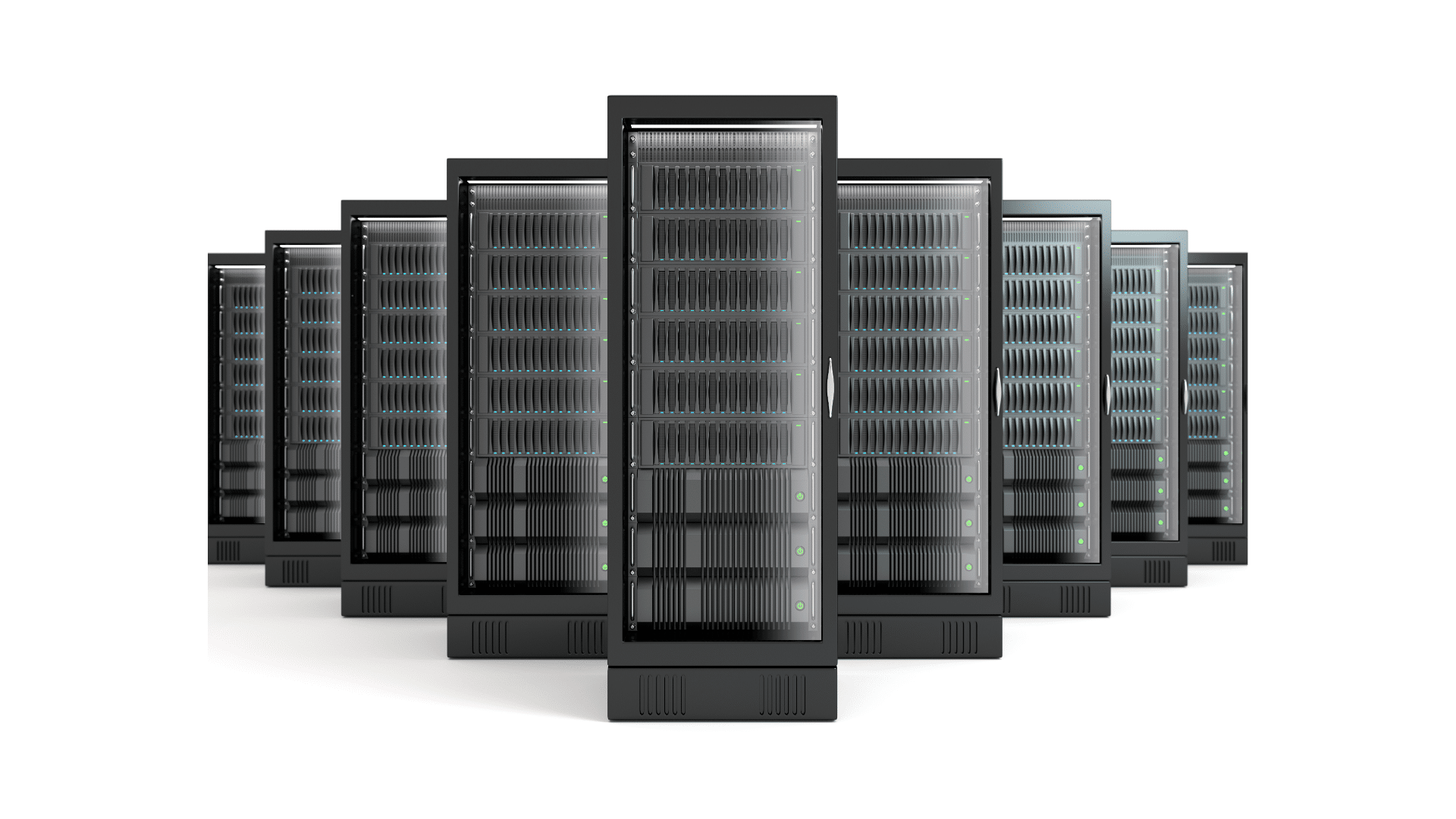Top-Server-Speicherlösungen für 2025: Ein umfassender Leitfaden

Looking for server storage solutions? This guide will review the top options tailored to different needs. Learn about solutions that you can configure to your specifications, streamlining IT performance and enhancing operational efficiency through speed, data management, and backup. Find the right fit for your business.
Inhalt
- Introduction to Server Storage
- Overview of Top Server Storage Solutions
- Types of Server Storage
- Storage Infrastructure
- Broadberry CyberStore WSS – Best for Windows Environments
- Lenovo ThinkSystem SR630 V2 – Best for Versatility
- Open-E DSS v7 – Best for Unified Storage Management
- Bacula Enterprise Storage Server Solutions – Best for Backup and Recovery
- Fibre Channel Storage Server – Best for High-speed Data Transfer
- Data Management
- Sicherheit und Compliance
- Cloud and Virtualization
- Data Center Considerations
- Choosing the Right Server Storage Solution
- Zusammenfassung
- Häufig gestellte Fragen
- What is the best server storage solution for Windows environments?
- Which server storage solution offers the best versatility?
- What storage solution is ideal for unified storage management?
- Which storage solution should I choose for backup and recovery?
- What is the best server storage solution for high-speed data transfer?
Introduction to Server Storage

Server storage refers to the use of storage devices and systems to store, manage, and protect data in a server environment. This can include a range of technologies, such as network attached storage (NAS), direct attached storage (DAS), and storage area networks (SANs).
Server storage is a vital component of any IT infrastructure, as it provides a centralized location for storing and managing data, as well as enabling multiple users to access and share files. With the increasing demand for data storage, server storage solutions have become more advanced, offering high capacity, energy efficiency, and simplified operations.
Integrating robust storage systems is crucial to efficiently manage and protect the data associated with databases within organizations, especially in high-performance applications like virtualization and analytics.
Modern server storage solutions are designed to meet businesses’ diverse needs, from small to large enterprises. They offer a variety of features, such as high-capacity storage, energy-efficient designs, and advanced data protection mechanisms.
These solutions ensure that data is stored securely and, importantly, remains easily accessible to authorized users. By leveraging the latest storage technologies, businesses can optimize their data management processes, improve operational efficiency, and protect their valuable assets.
Overview of Top Server Storage Solutions

In the discussion below we’ll be taking a look at the top storage solutions for servers. From small businesses to large enterprises, and everywhere in between, different customers benefit from these top server storage solutions.
- Best for Windows Environments: Broadberry CyberStore WSS
- Best for Versatility: Lenovo ThinkSystem SR630 V2
- Best for Unified Storage Management: Open-E DSS v7
- Best for Backup and Recovery: Bacula Enterprise Storage Server Solutions
- Best for High-speed Data Transfer: Fibre Channel Storage Server
Types of Server Storage
There are several types of server storage solutions available, each with its own strengths and weaknesses. These include NAS, DAS, SANs, and object storage.
NAS is a popular choice for small businesses and office environments, as it provides a simple and cost-effective way to share files and collaborate on projects. NAS systems are easy to set up and manage, making them ideal for businesses that need a reliable storage solution without the complexity of more advanced systems. NAS systems can manage files and applications from a single device, and they allow users to efficiently manage data through the structure of directories, folders, and files.
DAS, on the other hand, is a more traditional approach to storage, where devices are connected directly to a server or workstation. This type of storage is great for fast access to data as it is known for its high performance and low latency. However, DAS systems can be less flexible and scalable compared to other storage solutions.
SANs are typically used in larger enterprise environments, where they provide a high-performance and scalable storage solution. SANs use a dedicated network to connect storage devices, allowing for efficient data transfer and management. This type of storage is ideal for businesses that require a robust and scalable solution to handle large amounts of data and demanding workloads. Disk enclosures play a crucial role in providing flexible and cost-effective storage solutions within SANs, enhancing their capacity and efficiency.
Object storage is a newer technology that is optimized for storing large amounts of unstructured data, such as videos and images. Unlike traditional file storage systems, object storage uses a flat address space and metadata to manage data, making it highly scalable and efficient. This type of storage is particularly useful for businesses that need to store and manage large volumes of data, such as media companies and cloud service providers.
Storage Infrastructure

Fibre Channel Switches
Fibre Channel switches are a crucial component of a storage infrastructure, providing high-performance connectivity between servers and storage devices. These switches enable fast and reliable data transfer, making them ideal for applications that require low latency and high throughput.
With advanced traffic management and congestion control features, Fibre Channel switches ensure that data is delivered efficiently and securely.
For small businesses and enterprises alike, Fibre Channel switches offer a scalable and flexible solution for expanding storage capacity and improving overall system performance. They are designed to handle the demands of modern data centers, where reliable and high-speed data transfer is crucial.
By integrating Fibre Channel switches into your storage infrastructure, you can achieve better performance, reduce bottlenecks, and ensure that your data remains accessible and protected.
Storage Area Network (SAN) Architecture
A Storage Area Network (SAN) architecture is a dedicated network that connects servers and storage devices, providing a centralized and efficient way to manage data storage. SANs offer a high level of scalability, flexibility, and reliability, making them suitable for large-scale enterprise storage solutions.
With a SAN architecture, businesses can simplify operations, improve data protection, and increase storage capacity, all while reducing the risk of data loss.
By utilizing Fibre Channel switches and other advanced technologies, SANs provide fast and secure data transfer, ensuring that critical applications and services remain available and accessible.
This architecture is particularly beneficial for businesses that require robust and scalable storage solutions to handle large amounts of data and demanding workloads. Implementing a SAN can help streamline your storage management processes, enhance data security, and support the growth of your enterprise.
Broadberry CyberStore WSS – Best for Windows Environments
Specifications:
- Pre-configured with Microsoft Windows Storage Server 2019, which can be complemented by tools like Azure Storage-Explorer.
Pros:
- Seamless integration with Windows-based systems
- Advanced security protocols
- Efficient performance with Windows applications
Cons:
- Higher starting price compared to some competitors
The Broadberry CyberStore WSS stands out for its seamless integration into Windows-based systems, making it an excellent option for businesses that depend heavily on Microsoft’s suite of technologies.
It comes pre-configured with the Microsoft Windows Storage Server 2019 to ensure a smooth operation of well-known office applications and software without any compatibility issues. Enhanced security measures are built-in to protect critical data, providing reassurance in the face of current cyber threats.
Depending on set up, it can get pricy, and the initial cost may be a significant factor for small businesses operating within limited budgets. Despite this concern, its effective performance coupled with extensive support for various Windows programs renders it a worthwhile investment for enterprises looking to implement a dependable storage solution configured specifically for their needs in store environments.
Rating:
- Design: 4/5
- Performance: 4.5/5
- Security: 5/5
Lenovo ThinkSystem SR630 V2 – Best for Versatility
Specifications:
- Supports up to two Intel® Xeon® Scalable processors
- Up to 16 NVMe drives possible
Pros:
- Highly versatile and customizable
- Excellent performance for varied workloads
Cons:
- Can be overkill for small businesses
The Lenovo ThinkSystem SR630 V2 is a multifaceted server that adeptly manages an array of workloads, including those from cloud services, virtualization platforms, and analytical operations.
It supports the integration of up to two Intel® Xeon® Scalable processors and excels in delivering top-tier performance suitable for multitasking scenarios. Its flexibility is heightened by Lenovo’s AnyBay technology, which allows for a variety of storage setups.
While the extensive capabilities offered by the SR630 V2 may surpass the requirements of smaller companies, it stands out for large enterprises that demand high-performance capacity—especially beneficial in database management and analytics tasks—with support for up to 16 NVMe drives enhancing IOPS.
The inclusion of Lenovo XClarity management tools streamlines hardware administration efforts significantly through cutting-edge technology solutions designed to bolster operational productivity.
Rating:
- Design: 4.5/5
- Performance: 5/5
- Flexibility: 5/5
Open-E DSS v7 – Best for Unified Storage Management
Supports NAS, iSCSI SAN, InfiniBand, and Fibre Channel SAN, including network attached storage.
Pros:
- Cost-effective
- Scalable and robust data protection features
Cons:
- May require technical expertise for optimal installation setup
Open-E DSS v7 provides an economical approach to managing unified storage, compatible with various operating systems, NAS, iSCSI SAN, InfiniBand, and Fibre Channel SAN.
It is designed to scale with the needs of growing small and medium-sized businesses by offering a singular management interface for straightforward operations.
While initial configuration might necessitate specialized knowledge, Open-E DSS v7 boasts strong data protection capabilities like snapshot-based replication that safeguard data integrity and security.
Consequently, it serves as an optimal choice for enterprises seeking to administer their storage systems both efficiently and in a financially prudent manner.
Rating:
- Design: 4/5
- Performance: 4.5/5
- Manageability: 4/5
Bacula Enterprise Storage Server Solutions – Best for Backup and Recovery
Specializes in backup, recovery, and verification of data loss support backup services across a network.
Pros:
- Comprehensive backup and recovery features
- Network-wide data protection and a comprehensive portfolio
Cons:
- Monthly cost can add up
Bacula Enterprise is celebrated for its strong backup and recovery functions, which guarantee the protection of data throughout a network. It offers essential features such as backup, recovery, and verification processes that are critical for businesses focused on safeguarding their data.
On the other hand, with a monthly fee pricing model, some enterprises might view this cost as significant over an extended period.
Still, given its extensive capabilities and robust protection across networks, Bacula Enterprise represents a worthwhile expenditure for companies aiming to secure their data reliably.
Rating:
- Design: 4/5
- Performance: 4.5/5
- Backup & Recovery: 5/5
Fibre Channel Storage Server – Best for High-speed Data Transfer
Specifications:
- Data transfer rates exceeding 32 Gbps
- Advanced error correction mechanisms
Pros:
- High-speed data transfer
- Advanced features like Quality of Service
Cons:
- Higher cost
Storage servers equipped with Fibre Channel technology are renowned for their ability to transfer data at impressive speeds that surpass 32 Gbps, which is particularly beneficial for applications demanding high performance, such as continuous video surveillance.
These servers play a crucial role in data centers requiring the highest levels of throughput and minimal latency. They incorporate sophisticated error correction techniques to maintain the integrity of data as it’s transmitted, thus delivering dependable and consistent performance.
Although Fibre Channel systems may come with one of the highest price tags, they justify this investment through advanced capabilities such as Quality of Service (QoS).
This makes them an appealing option for businesses seeking storage solutions that provide both swift data movement and reliable server operations.
Rating:
- Design: 4/5
- Performance: 5/5
- Speed: 5/5
Data Management
Effective data management is critical in any server storage environment. This includes ensuring that data is properly organized, protected, and easily accessible. Data management solutions can help to simplify operations, improve performance, and reduce the risk of data loss.
These solutions can include data protection software, backup and recovery tools, and storage management systems.
By implementing a comprehensive data management strategy, businesses can ensure that their data is safe, secure, and easily accessible. Data protection software can help to safeguard data against unauthorized access and cyber threats, while backup and recovery tools ensure that data can be restored in the event of a failure or disaster.
Storage management systems provide a centralized platform for managing storage resources, optimizing performance, and simplifying operations.
In addition to protecting data, effective data management can also provide valuable insights into data usage and trends. By analyzing data patterns and usage, businesses can make informed decisions about their storage needs and optimize their storage infrastructure for better performance and efficiency.
Sicherheit und Compliance
Security and compliance are critical considerations in any server storage environment. This includes ensuring that data is properly protected from unauthorized access, and that all relevant regulations and standards are met.
Storage solutions can include a range of security features, such as encryption, access controls, and authentication.
Encryption is a key security feature that helps to protect data by converting it into a secure format that can only be accessed by authorized users.
Access controls and authentication mechanisms ensure that only authorized personnel can access sensitive data, reducing the risk of data breaches and unauthorized access.
Businesses must also ensure that their storage infrastructure is compliant with relevant regulations, such as GDPR and HIPAA.
Compliance with these regulations is essential for protecting sensitive data and avoiding legal and financial penalties. By implementing a comprehensive security and compliance strategy, businesses can ensure that their data is safe and secure, and that they are able to meet all relevant regulatory requirements.
Cloud and Virtualization
Cloud and virtualization technologies are increasingly being used in server storage environments. Cloud storage provides a scalable and flexible way to store and manage data, and can be used to support a range of applications and workloads.
Virtualization technologies, such as VMware and Hyper-V, can be used to create virtual storage environments, and to improve the efficiency and flexibility of storage infrastructure.
By leveraging cloud and virtualization technologies, businesses can improve the performance and scalability of their storage infrastructure, and reduce costs. Cloud storage offers a single point of access to all your files, making it easy to manage and share data across different locations and devices.
It also provides better performance and reliability, as data is stored in multiple locations and can be accessed from anywhere with an internet connection.
Virtualization technologies allow businesses to create virtual storage environments that can be easily scaled and managed. This can help to optimize storage resources, improve performance, and reduce the complexity of managing physical storage devices.
By using cloud and virtualization technologies, businesses can create a flexible and scalable storage solution that meets their needs and supports their growth.
Data Center Considerations

Data Center Infrastructure
Data center infrastructure is a critical component of any organization’s IT strategy, providing the foundation for storing, processing, and managing large amounts of data.
A well-designed data center infrastructure should include a comprehensive portfolio of storage solutions, such as network attached storage (NAS), direct attached storage (DAS), and storage area networks (SANs). By considering factors such as energy efficiency, high capacity, and scalability, businesses can create a data center infrastructure that meets their current and future needs.
Energy efficiency is a key consideration in modern data centers, as it helps reduce operational costs and environmental impact. High-capacity storage solutions ensure that businesses can store and manage large volumes of data without compromising performance.
Scalability is also crucial, as it allows the infrastructure to grow with the business, accommodating increasing data storage demands.
Additionally, a reliable and secure data center infrastructure is crucial for protecting against data loss and ensuring business continuity. Implementing robust security measures, such as encryption and access controls, can help safeguard sensitive data and comply with regulatory requirements.
By investing in a well-designed data center infrastructure, businesses can ensure that their data is stored securely, managed efficiently, and remains accessible when needed.
Choosing the Right Server Storage Solution

Selecting an appropriate storage solution for server data necessitates a thorough analysis of your existing volume of data and its expected increase, as the ability to scale will greatly influence future requirements for storage capacity.
It is vital to account for distinct needs pertinent to your business, such as rapid transmission of data, integrated management of storage systems or all-encompassing solutions for backup and recovery in relation to storing object-based information.
Analyzing data insights can help businesses make informed decisions about their storage needs, ensuring that the chosen solution supports effective decision-making and enhances data resiliency.
Fibre Channel-equipped servers offer premier performance when low latency and swift transfer rates are pivotal, supplemented by sophisticated mechanisms to correct errors.
Alternatively, Broadberry CyberStore WSS presents an optimal choice within Windows settings due to its streamlined integration capabilities along with heightened security measures supported by flash storage technology.
In essence, pinpointing the most suitable option hinges on individualized necessities tied to your enterprise’s operations budget constraints, coupled with a forward-looking approach to managing company data.
A meticulous assessment concerning each potential choice’s functions and proficiency will aid you in finding a server that not only caters effectively but also evolves congruently alongside your business expansion.
Zusammenfassung
To effectively manage data in the modern digital realm, selecting an appropriate storage server solution is of paramount importance. Each product we have examined comes with distinct advantages and capabilities to suit varied corporate needs. The Broadberry CyberStore WSS stands out within Windows-based environments, powered by advanced technologies to ensure robust performance.
Conversely, the Lenovo ThinkSystem SR630 V2 is renowned for its exceptional adaptability. The Open-E DSS v7 introduces comprehensive storage management, Bacula Enterprise specializes in backup and recovery processes, and Fibre Channel Storage Servers are recognized for their swift data transfers.
When sifting through these possibilities, it’s essential to weigh your business’s specific demands regarding data volume as well as anticipated expansion plans. A wise investment in a suitable storage solution ensures that your enterprise can process data with efficiency, security measures intact and has enough scalability to sustain future growth trajectories successfully. Dedicate ample time to scrutinize each option so you may identify the one most closely attuned to your organizational objectives.
Häufig gestellte Fragen
What is the best server storage solution for Windows environments?
The Broadberry CyberStore WSS is the ideal server storage solution for Windows environments, providing seamless integration with Microsoft technologies and robust security features.
Your choice will enhance performance and security in your setup.
Which server storage solution offers the best versatility?
The Lenovo ThinkSystem SR630 V2 offers the best versatility with its support for various workloads and customizable configurations.
This makes it an ideal choice for diverse server storage needs.
What storage solution is ideal for unified storage management?
Open-E DSS v7 offers an optimal unified storage management solution, delivering a variety of storage capabilities along with affordable scalability options.
Which storage solution should I choose for backup and recovery?
For backup and recovery, Bacula Enterprise Storage Server Solutions is a strong choice due to its comprehensive network-wide data protection and verification features.
It ensures your data is secure and recoverable when you need it.
What is the best server storage solution for high-speed data transfer?
Fibre Channel Storage Servers are optimal for high-speed data transfer, offering rates over 32 Gbps and robust features such as Quality of Service.
This makes them an excellent choice for demanding storage needs.
